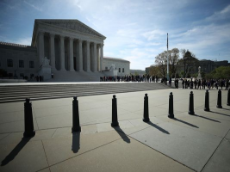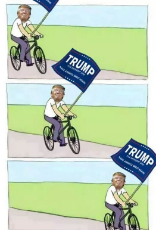>A divided Supreme Court gave President Trump's immigration travel ban a better reception Wednesday than it's received in lower courts over the past 15 months, raising the chances that it will uphold restrictions on travelers from five predominantly Muslim countries.
>The court's conservative justices appeared sympathetic to the administration's contention that it has the authority to regulate immigration in the name of national security. They also voiced skepticism about the relevance of Trump's campaign promises and statements regarding Muslims.
>"If you look at what was done, it does not look at all like a Muslim ban," Justice Samuel Alito said, noting it applies to about 8% of the world's Muslims. "There are other justifications that jump out as to why these particular countries were put on the list."
>While the justices often don't indicate during oral argument which way they will vote, only Justice Anthony Kennedy among the court's five conservatives sounded conflicted. Chief Justice John Roberts, Alito and Justice Neil Gorsuch saved most of their questions for the challengers.
>The four liberal justices peppered the government's side with questions, but Justice Stephen Breyer voiced concern mostly about the ability of travelers from five majority-Muslim countries to get waivers. Only 430 have been issued to date; the ban affects nearly 150 million people
>The lively, hour-long oral argument represented the penultimate action in a debate dating back to the first weeks of Trump's presidency, and even to his volatile campaign for the White House. A decision is expected at the end of June.
>U.S. Solicitor General Noel Francisco urged the justices to take note of the third travel ban's specificity, including different criteria for each country and six-month reporting requirements. That elicited what appeared to be praise from Justice Anthony Kennedy, who could be the decisive vote.
>But Kennedy also joined the court's more liberal justices in wondering how the president's campaign statements might infect his policies. If a mayoral candidate pledged to do something terrible and did it upon winning election, he said, wouldn't that be relevant?
>Francisco shot back. "This is not a so-called Muslim ban," he said. "If it were, it would be the most ineffective Muslim ban that one could possibly imagine."
>The California- and Virginia-based federal appeals courts that ruled against Trump said courts can examine the purpose behind government actions and that Trump's words reveal he seeks to ban Muslims. Indeed, most of the judges who issued rulings have said his statements as a candidate, president-elect and president are relevant.
>Judges and legal analysts who defend the travel ban argue that Trump's words cannot form the basis for a constitutional violation. It takes too much interpretation, they say, to read anti-Muslim bias into an executive order or proclamation that, on its surface, is devoid of religious content.
Several judges have gone further, arguing that campaign promises should be off-limits, or at least dwarfed by government actions that are not overtly discriminatory.
>The high court showdown was of such interest that Chief Justice John Roberts agreed to release the audio recording of the morning's oral argument later in the day, rather than at the end of the week. The last time the court did that was for the oral arguments on same-sex marriage in 2015.
http://archive.is/9TPjK
/mlpol/ - My Little Politics
Archived thread
>>143365
Everyone focuses in on the stupid handshakes, and Trump nears scoring another major victory. Don't want to give him credit for 4D chess, but this is another amazing coincidence.
Everyone focuses in on the stupid handshakes, and Trump nears scoring another major victory. Don't want to give him credit for 4D chess, but this is another amazing coincidence.
>>143374
This has been the probable outcome of the whole debacle all along. Everyone knew it was headed for the Supreme Court, and it's been more or less assumed that the Supreme Court will probably decide in Trump's favor because there's frankly no solid argument as to why this ban shouldn't go through. The media has been playing up the lower courts' rulings like it's some kind of massive defeat for Trump when really it's just further evidence that courts are just as partisan and corrupt as the rest of the government, and that Democrats are only concerned with advancing their own agenda and could care less about the letter of the law when it doesn't work in their favor.
Trump isn't the best president the nation's ever had or that we can aspire to, but he's definitely been more successful than either of his two predecessors. I would say this has so far turned out to be the best administration in recent history, at least since Reagan.
This has been the probable outcome of the whole debacle all along. Everyone knew it was headed for the Supreme Court, and it's been more or less assumed that the Supreme Court will probably decide in Trump's favor because there's frankly no solid argument as to why this ban shouldn't go through. The media has been playing up the lower courts' rulings like it's some kind of massive defeat for Trump when really it's just further evidence that courts are just as partisan and corrupt as the rest of the government, and that Democrats are only concerned with advancing their own agenda and could care less about the letter of the law when it doesn't work in their favor.
Trump isn't the best president the nation's ever had or that we can aspire to, but he's definitely been more successful than either of his two predecessors. I would say this has so far turned out to be the best administration in recent history, at least since Reagan.
3 replies | 2 files | 1 UUIDs | Archived


 Ex: Type :littlepip: to add Littlepip
Ex: Type :littlepip: to add Littlepip  Ex: Type :eqg-rarity: to add EqG Rarity
Ex: Type :eqg-rarity: to add EqG Rarity 